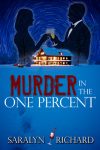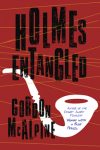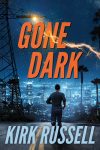

March 19 – 25: “How have your readers shaped your books?
 This week ITW Members Saralyn Richard, Phillip Donlay, Karen Harper, Gordon McAlpine, Kirk Russell and Alethea Kontis describe how readers have shaped their books? Scroll down the ‘comments’ section below to follow this thrilling conversation!
This week ITW Members Saralyn Richard, Phillip Donlay, Karen Harper, Gordon McAlpine, Kirk Russell and Alethea Kontis describe how readers have shaped their books? Scroll down the ‘comments’ section below to follow this thrilling conversation!
~~~~~
 Mystery and children’s book author, Saralyn Richard, is a writer who teaches on the side. Some of her poems and essays have won awards and contests from the time she was in high school. Her children’s picture book, Naughty Nana, has reached thousands of children worldwide. Murder in the One Percent, her debut mystery novel, pulls back the curtain on America’s wealthy and powerful elite. A member of International Thriller Writers and Mystery Writers of America, Saralyn is revising her second mystery.
Mystery and children’s book author, Saralyn Richard, is a writer who teaches on the side. Some of her poems and essays have won awards and contests from the time she was in high school. Her children’s picture book, Naughty Nana, has reached thousands of children worldwide. Murder in the One Percent, her debut mystery novel, pulls back the curtain on America’s wealthy and powerful elite. A member of International Thriller Writers and Mystery Writers of America, Saralyn is revising her second mystery.
 Gordon McAlpine is the author of Woman with a Blue Pencil and Hammett Unwritten and numerous other novels, as well as a middle-grade trilogy, The Misadventures of Edgar and Allan Poe. Additionally, he is coauthor of the nonfiction book The Way of Baseball, Finding Stillness at 95 MPH. He has taught creative writing and literature at U.C. Irvine, U.C.L.A., and Chapman University. He lives with his wife Julie in Southern California.
Gordon McAlpine is the author of Woman with a Blue Pencil and Hammett Unwritten and numerous other novels, as well as a middle-grade trilogy, The Misadventures of Edgar and Allan Poe. Additionally, he is coauthor of the nonfiction book The Way of Baseball, Finding Stillness at 95 MPH. He has taught creative writing and literature at U.C. Irvine, U.C.L.A., and Chapman University. He lives with his wife Julie in Southern California.
 As a young man, Philip Donlay’s life was shaped by two distinct events. At the age of seventeen, he earned his pilot’s license, and at eighteen was published in a national aviation magazine. The combination of these two passions, flying and writing, has led to successful careers as both a professional pilot and best-selling novelist. Donlay has been a flight instructor, flown a private jet for a Saudi prince, and for twenty-eight years flew a corporate jet for a Fortune 500 company. His travels have taken him to over forty countries on five continents. He divides his time between Montana and the Pacific Northwest. SPEED THE DAWN is his eighth thriller in the best-selling Donovan Nash series.
As a young man, Philip Donlay’s life was shaped by two distinct events. At the age of seventeen, he earned his pilot’s license, and at eighteen was published in a national aviation magazine. The combination of these two passions, flying and writing, has led to successful careers as both a professional pilot and best-selling novelist. Donlay has been a flight instructor, flown a private jet for a Saudi prince, and for twenty-eight years flew a corporate jet for a Fortune 500 company. His travels have taken him to over forty countries on five continents. He divides his time between Montana and the Pacific Northwest. SPEED THE DAWN is his eighth thriller in the best-selling Donovan Nash series.
 Karen Harper is the New York Times bestselling author of 80 books. Published since 1982, she writes contemporary suspense and historical novels. After living in South Florida for 30 winters, she decided to set her SOUTH SHORES series there and in the Caribbean. A former Ohio State English instructor, Karen now writes full time, which gives her and her husband time to travel.
Karen Harper is the New York Times bestselling author of 80 books. Published since 1982, she writes contemporary suspense and historical novels. After living in South Florida for 30 winters, she decided to set her SOUTH SHORES series there and in the Caribbean. A former Ohio State English instructor, Karen now writes full time, which gives her and her husband time to travel.
 Kirk Russell is the author of ten crime novels and three series, Marquez, head of a California undercover wildlife team, Raveneau, a San Francisco homicide inspector, and FBI special agent, Paul Grale, of the Las Vegas FBI domestic terrorism squad. Russell’s novels have received numerous starred reviews. He lives in Berkeley, CA.
Kirk Russell is the author of ten crime novels and three series, Marquez, head of a California undercover wildlife team, Raveneau, a San Francisco homicide inspector, and FBI special agent, Paul Grale, of the Las Vegas FBI domestic terrorism squad. Russell’s novels have received numerous starred reviews. He lives in Berkeley, CA.
 New York Times bestselling author Alethea Kontis is a princess, a voice actress, a force of nature, and a mess. She is responsible for creating the epic fairytale fantasy realm of Arilland, and dabbling in a myriad of other worlds beyond. Her award-winning writing has been published for multiple age groups across all genres. Host of “Princess Alethea’s Fairy Tale Rants” and Princess Alethea’s Traveling Sideshow every year at Dragon Con, Alethea also narrates for ACX, IGMS, Escape Pod, Pseudopod, and Cast of Wonders. Born in Vermont, Alethea currently resides on the Space Coast of Florida with her teddy bear, Charlie.
New York Times bestselling author Alethea Kontis is a princess, a voice actress, a force of nature, and a mess. She is responsible for creating the epic fairytale fantasy realm of Arilland, and dabbling in a myriad of other worlds beyond. Her award-winning writing has been published for multiple age groups across all genres. Host of “Princess Alethea’s Fairy Tale Rants” and Princess Alethea’s Traveling Sideshow every year at Dragon Con, Alethea also narrates for ACX, IGMS, Escape Pod, Pseudopod, and Cast of Wonders. Born in Vermont, Alethea currently resides on the Space Coast of Florida with her teddy bear, Charlie.
- LAST GIRL MISSING with K.L. Murphy - July 25, 2024
- CHILD OF DUST with Yigal Zur - July 25, 2024
- THE RAVENWOOD CONSPIRACY with Michael Siverling - July 19, 2024
